高中英语新人教版必修五Unit1 Great Scientists 单元课件(104页PPT)
文档属性
| 名称 | 高中英语新人教版必修五Unit1 Great Scientists 单元课件(104页PPT) |
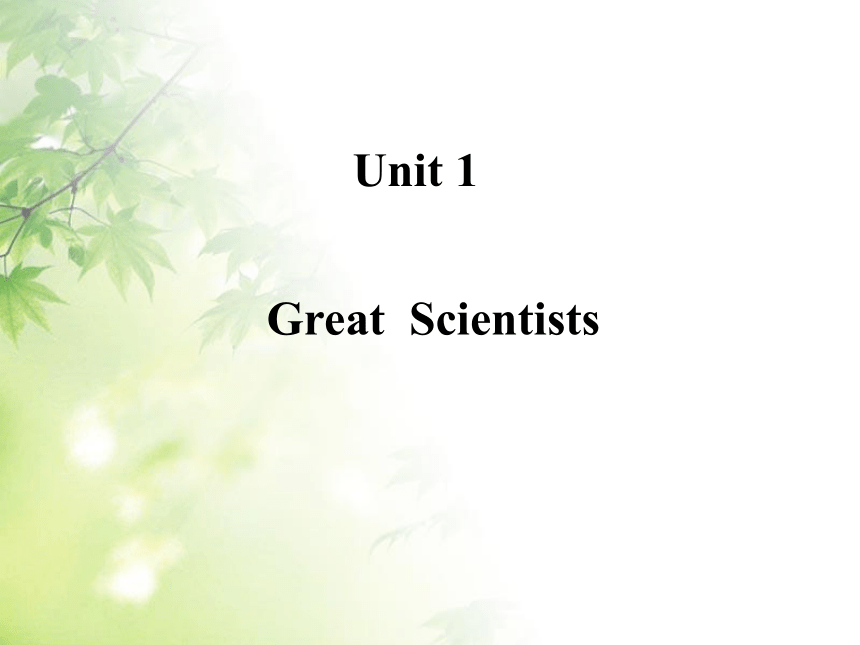
|
|
| 格式 | ppt | ||
| 文件大小 | 7.1MB | ||
| 资源类型 | 教案 | ||
| 版本资源 | 人教版(新课程标准) | ||
| 科目 | 英语 | ||
| 更新时间 | 2020-11-07 19:56:10 | ||
图片预览

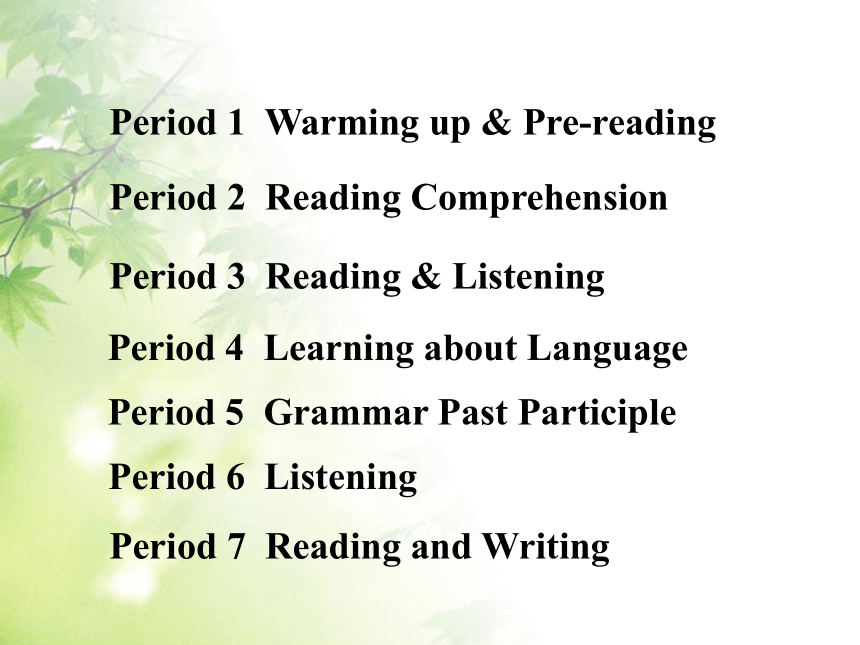
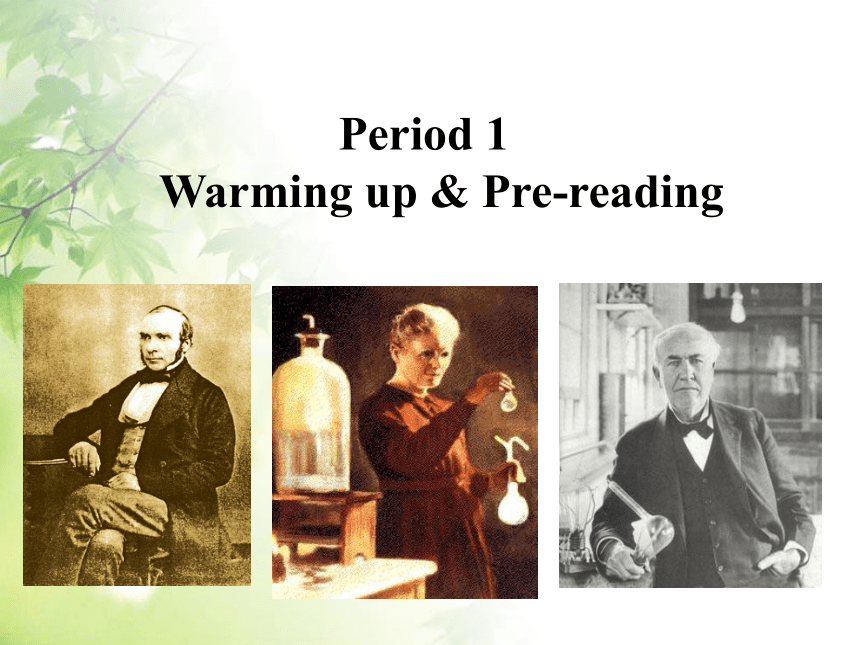
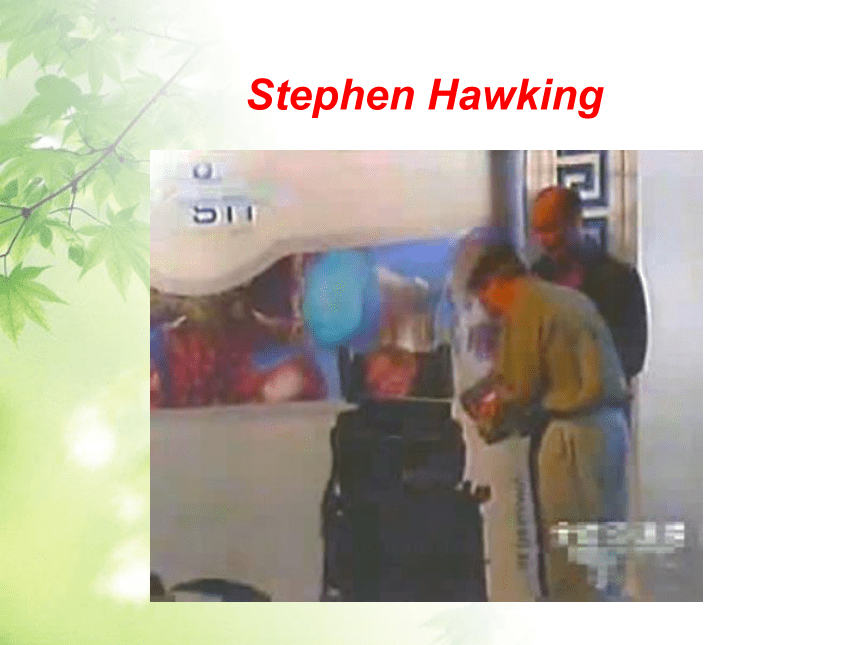
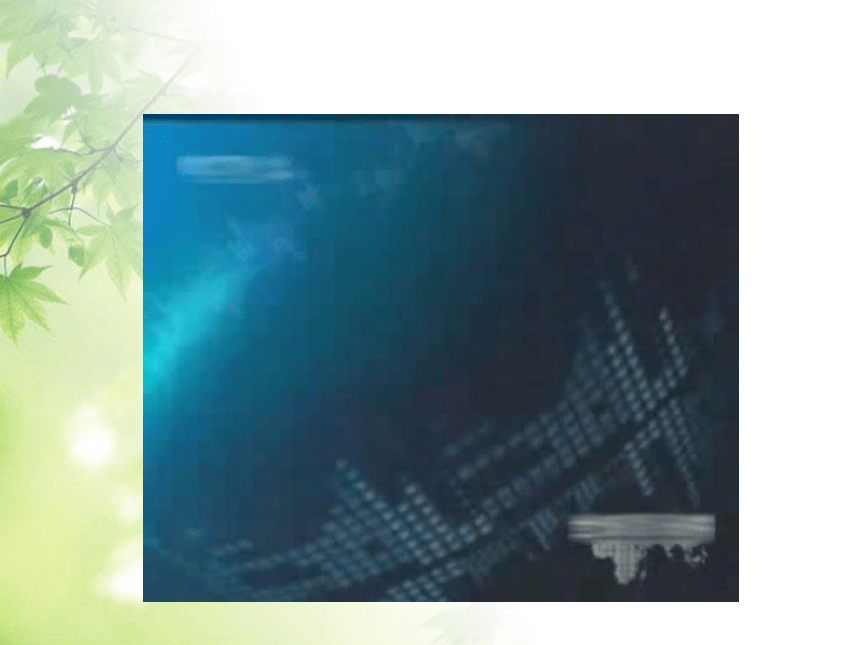
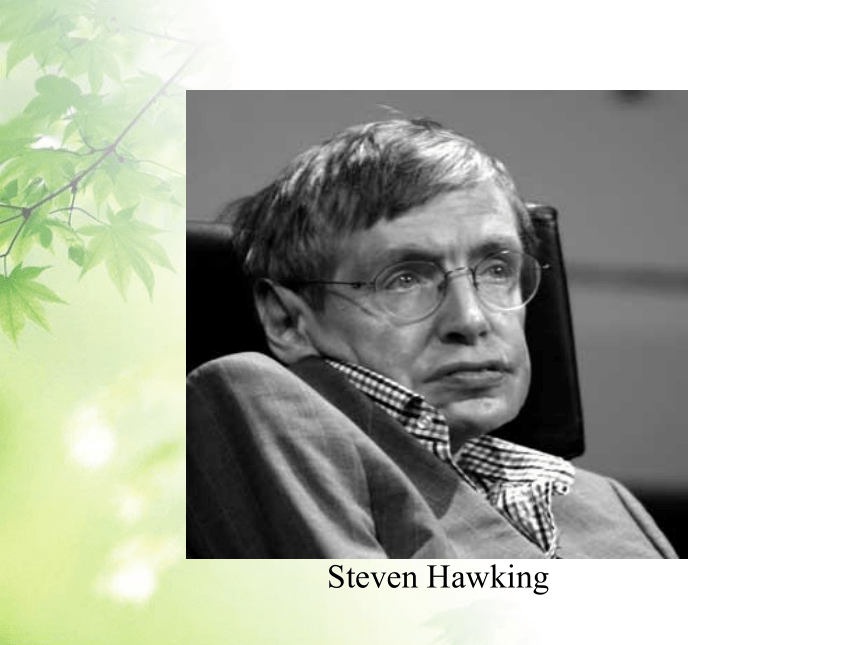
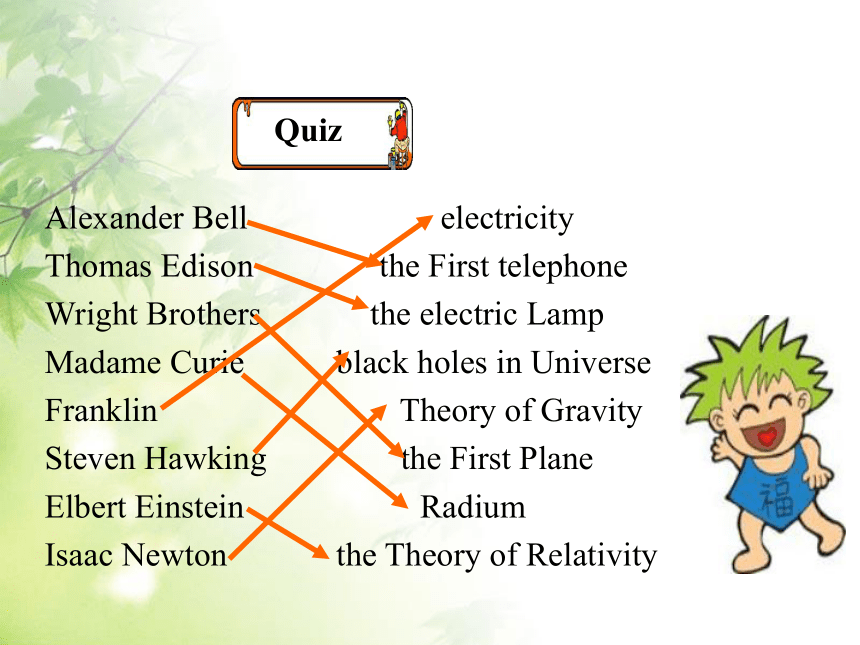
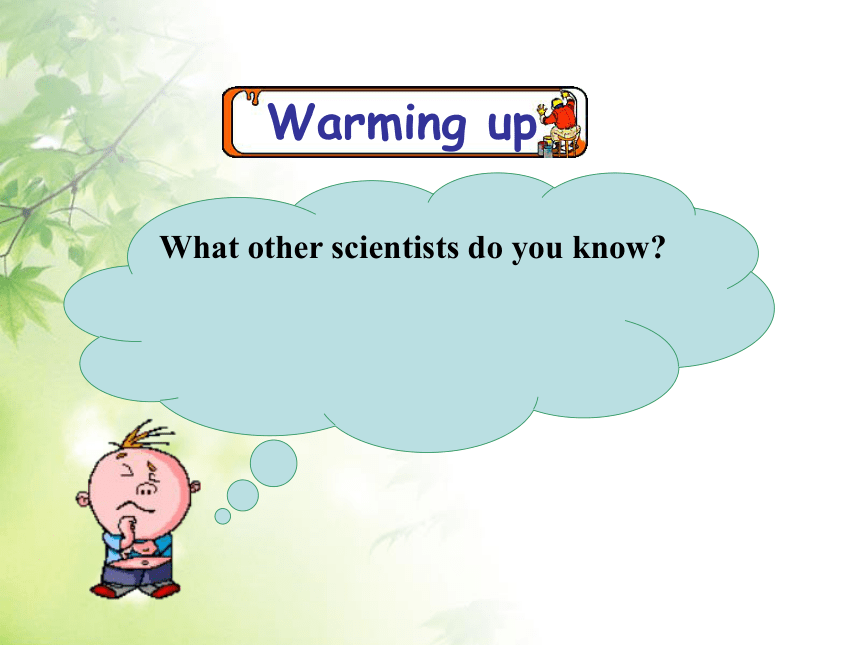
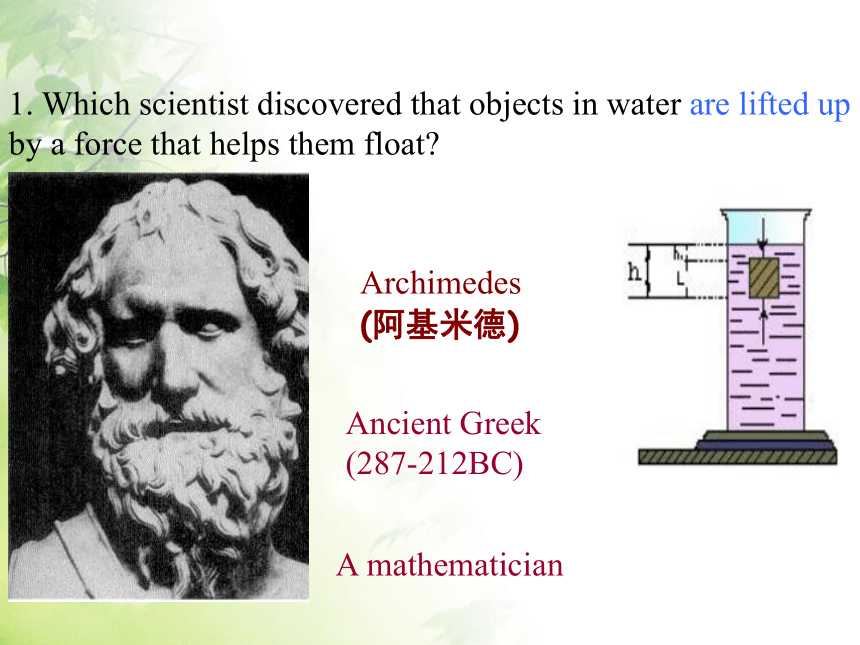
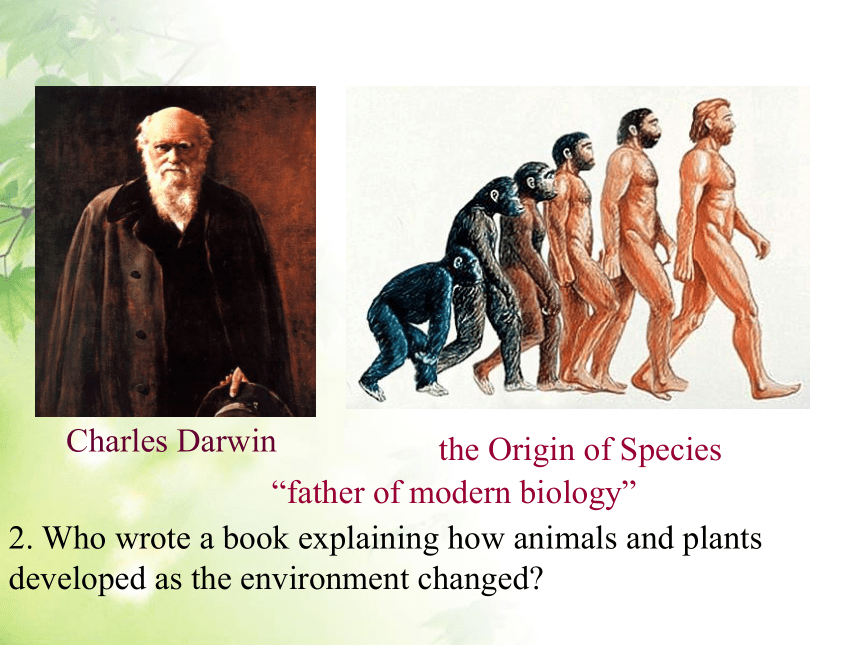
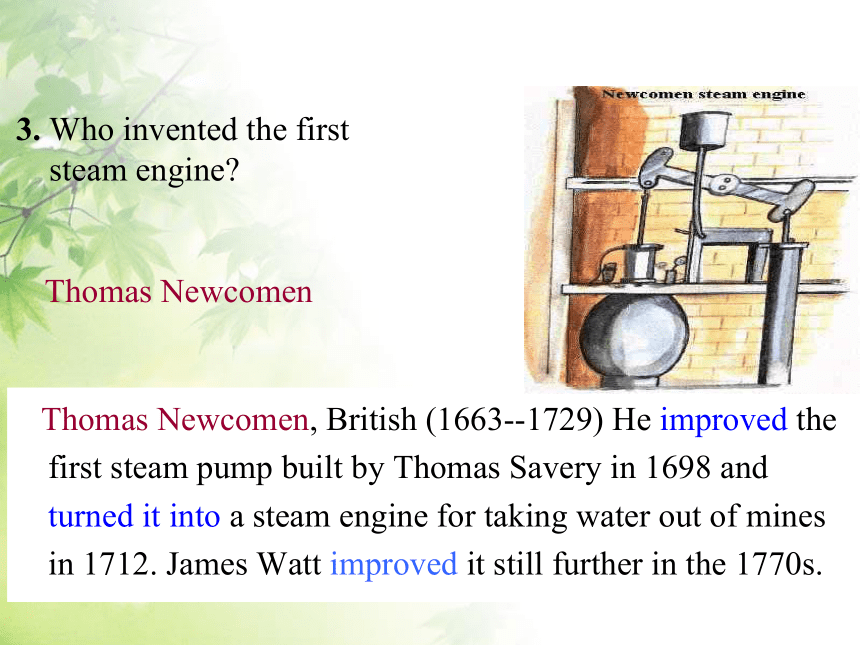
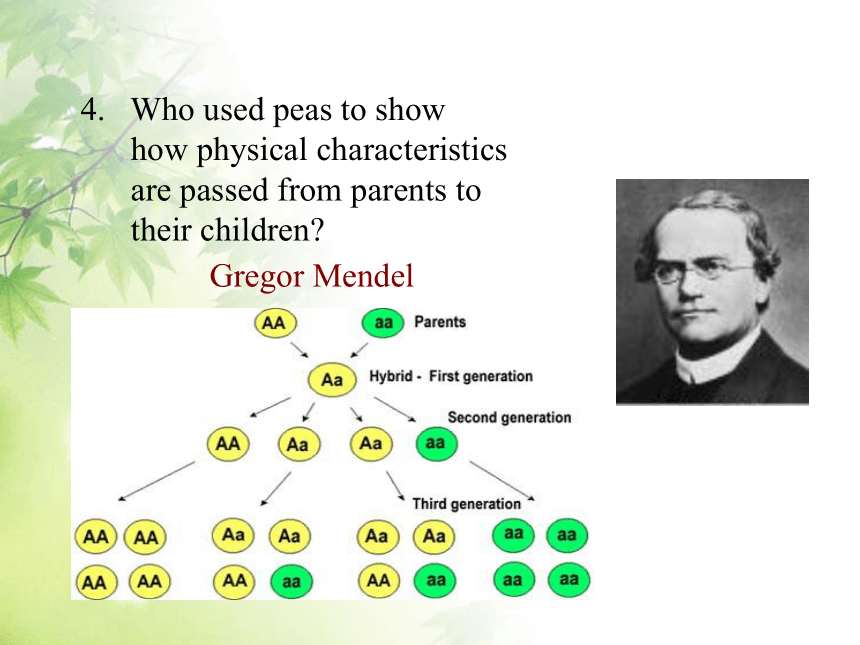
文档简介
Unit 1
Great Scientists
Period 1 Warming up & Pre-reading
Period 2 Reading Comprehension
Period 3 Reading & Listening
Period 4 Learning about Language
Period 5 Grammar Past Participle
Period 6 Listening
Period 7 Reading and Writing
Period 1
Warming up & Pre-reading
Stephen Hawking
Steven Hawking
Alexander Bell electricity
Thomas Edison the First telephone
Wright Brothers the electric Lamp
Madame Curie black holes in Universe
Franklin Theory of Gravity
Steven Hawking the First Plane
Elbert Einstein Radium
Isaac Newton the Theory of Relativity
Quiz
Warming up
What other scientists do you know?
Archimedes
(阿基米德)
1. Which scientist discovered that objects in water are lifted up by a force that helps them float?
Ancient Greek
(287-212BC)
A mathematician
Charles Darwin
2. Who wrote a book explaining how animals and plants developed as the environment changed?
the Origin of Species
“father of modern biology”
3. Who invented the first
steam engine?
Thomas Newcomen, British (1663--1729) He improved the first steam pump built by Thomas Savery in 1698 and turned it into a steam engine for taking water out of mines in 1712. James Watt improved it still further in the 1770s.
Thomas Newcomen
4. Who used peas to show
how physical characteristics
are passed from parents to
their children?
Gregor Mendel
Leonardo da Vinci
5. Who was the painter that studied dead bodies to improve his painting of people?
Sir Humphry Davy, British (1778- 1829) He did research into different gases and discovered the medicinal value of nitrous(含氮的) oxide(氧化物) (or laughing gas) as an anaesthetic(麻醉剂). In 1815 he developed a safety lamp for miners.
Humphry Davy
6. Who invented a lamp
to keep miners safe
underground?
Zhang Heng, Chinese (78- 139). He invented the first seismograph(测震仪、地震仪) to indicate in the direction of an earthquake. It was in the shape of a cylinder(圆筒形) with eight dragonheads round the top, each with a ball in its mouth.
7. Who invented the earliest instrument to tell people where earthquakes happened?
Zhang Heng
Summary
Draw a conclusion: They all
made a great contribution
made great achievements
succeeded in their scientific career
overcome many difficulties
Topic 1:
What can you learn from these scientists?
Topic 2:
What qualities should we have to be a successful man?
Discussion1:
Would he impress you most during the SARS?
Zhong Nanshan (钟南山)
infectious diseases :
They can be spread to other people.
They have an unknown cause.
They are difficult to cure.
They need public health care to solve them.
Pre-reading:
Do you know how to prove a new
idea in scientific research?
Draw a conclusion
Think of a method
Collect results
Make a question
Find a problem
Analyse the results
Find supporting evidence
①
③
②
④
⑤
⑥
⑦
Stages in setting out a new
scientific idea:
Discussion 2
Put them in a right order
Homework
Write a composition “ What I can learn from________”
(name of a great scientist).
2. Memorize stages in setting out a new scientific idea.
Period 2
Reading Comprehension
John Snow defeats
“King cholera”
Learning aims:
1. Understand the whole text correctly.
2. Master some words and sentences.
3. Learn from the great scientist John Snow.
Come on!
Skimming
Who was the great scientist in the passage and what was the deadly disease of its day?
John Snow
cholera
British ( 1813~ 1858)
a legendary(传奇的) figure in the history of public health, epidemiology(流行病学) and anesthesiology(麻醉学)
John Snow
Cholera is the illness caused by a bacterium called Vibria
Cholerae. It infects people’s intestines(肠), causing diarrhea
(腹泻), vomiting and leg cramps.
It begins in the stomach and a severe case can lead to death
without immediate treatment.
And the victims died very quickly from a loss of liquid after
severe vomiting(呕吐) and diarrhea(腹泻).
Cholera:
How did John Snow defeat it?
1.What happened in 1854?
2. How many people died in 10 days?
3. Why is there no death at No. 20 and 21 Broad Street as well as at No. 8 and 9 Cambridge Street?
Cholera outbreak hit London.
500
These families had not drunk the water from the Broad Street pump.
Read quickly and silently to find answers to the following 7 questions.
Scanning
4. Why couldn’t the cholera be under control at first?
5. Which theory did John Snow believe in?
Neither its cause, not its cure was understood.
People absorbed cholera into their bodies with their meals.
6. John Snow finally proved the theory he believed by ________.
A. gathering information with the help of a map
B. looking into the source of the water for Broad Street and Cambridge Street
C. separating those who suffered cholera from those who didn’t
D. both A and B
7. To prevent the cholera from spreading again, what did John Snow do?
He suggested that the source of all water supplies be examined and that new methods of dealing with polluted water be found.
He instructed the water companies not to expose people to the polluted water any more.
Detailed reading
The problem
The cause
Idea 1:
Idea 2:
The method
Scientific Report by John Snow
Nobody knew the cause of the serious disease of cholera
a cloud of dangerous gas floated until it found its victims
people absorbed the disease into their bodies with meals
Collect information from the cholera outbreak to prove which theory was correct
The result
Idea 1 or 2? Why?
The conclusion
He found the cause of cholera was the polluted water
Idea 2. Because the information showed that the dirty water carried cholera
He defeated cholera by examining the water supply and dealing with the polluted water
①
③
②
④
⑤
⑥
⑦
Make a conclusion
Think of a method
Collect results
Find supporting evidence
Find a problem
Analyze the results
Draw a conclusion
①
②
③
④
⑤
⑥
⑦
Finish quickly the part1 in the page3 by working together.
John Snow began to test two theories.
An outbreak of cholera hit London in 1854.
John Snow marked the deaths on a map.
He announced that the water carried the disease.
John Snow investigated two streets where the outbreak was very severe.
King Cholera was defeated.
He found that most of the deaths were near a water pump.
He had the handle removed from the water pump.
2
1
4
7
3
8
5
6
Discussion 1
Period 3 Reading & Listening
relationship
attended her as her
personal physician.
Read the first paragraph aloud and
think how famous John Snow was?
Fill the blanks while listening
to the first paragraph.
John Snow was an doctor in London who ________
Queen Victoria as her personal __________. He thought about
helping ordinary people to cholera. Though the cause
and the of it were unknown, he wanted to face the _____
____________and solve the problem.
expert
attended
physician
exposed
cure
challenge
John Snow was a famous doctor in London– so expert,
Indeed, that be attended Queen Victoria as her personal
Physician.
约翰·斯诺是伦敦非常著名的医生,他的确医术精湛,
所以成了照料维多利亚女王的私人医生。
① expert
n.专家,能手
She is a reputable expert.
她是个有声望的专家。
He has no pretensions to being an expert on the subject.
他并不以这方面专家自居。
adj.熟练的;有专门技术或知识的
He is an expert on/at/in lung diseases.
他是肺部疾病方面的专家。
He is expert at/in painting.
他的专长是画画。
② attend v.
出席;参加
He decided to attend the meeting himself.
他决定亲自赴会。
照顾;看护
Doctor Smith attended her in hospital.
斯密斯医生在医院中给他治病。
attend school/church 上学/上教堂
2. So many thousands of terrified people died every time there
was an outbreak.
每次霍乱疾病的爆发,就有成千上万恐惧的人死去。
一些表示时间的名词词组如the moment, the minute,
the day, the first time, the year, next time;副词immediately,
directly, instantly 等也可引导时间状语从句。
①He left Europe the year World War Ⅱbroke out.
②My sister came directly immediately(=as soon as )
she got my short message.
二战爆发那年他离开了欧洲。
我姐姐一收到我的短信就来了。
Read Para 2&3 aloud while filling the blanks.
He became interested in two theories that possibly__________
how cholera killed people. The first ___________ that cholera
______________ in the air. A cloud of dangerous gas floated
around until it found its_________. The second suggested that
people _______this disease into their bodies With their meals.
From the stomach the disease quickly ____________ the body
and soon the __________ person died.
explained
suggested
multiplied
victims
absorbed
attacked
affected
John Snow __________ that the second theory was correct but
he needed___________. So when another outbreak hit London
in 1854, he was ready to begin his__________. As the disease
_________ quickly through poor neighbourhoods, he began to
gather information. In two _____________ streets, the cholera
Outbreak was _______________ more than 500 people died in
ten days. He was ____________ to find out why.
suspected
evidence
enquiry
spread
particular
so severe that
determined
3. The second suggested that people absorbed this disease into
their bodies with their meals.
第二种看法是在吃饭的时候人们把这种病毒引入体内的。
③ absorb vt./vi 吸收;专心于
A sponge absorbs water.
海绵吸水。
The little girl was absorbed in reading a tale.
这个小姑娘正在全神贯注地阅读一篇故事。
④ suspect v. 怀疑;不相信
I suspect the truth of her statement.
我对她那番话的真实性表示怀疑。
I strongly suspect that they’re trying to get rid of me.
我强烈地感觉到他们要除掉我。
What made you suspect her of having taken the money?
你凭什么怀疑钱时她偷的?
4. John Snow suspected that the second theory was correct but
he needed evidence.
斯诺猜测第二种说法是正确的,但他需要证明。
A map of Broad Street
What method did he use?
Broad Street
Many deaths happened here.
No death happened here.
The water from the pump was to blame.
Public house
Next, John Snow __________ the source of the water for these
two streets. He found that it came from the river____________
______________________________. HE immediately told the
___________ people in Broad Street to remove the handle from
the pump so that it could not be used. Soon afterwards ______
____________________________. He had shown that_______
_________________________________________________.
looked into
polluted by
the dirty water from London
astonished
the disease slowed down
cholera was spread by germs and not in a cloud of gas.
5. In two particular streets, the cholera outbreak was so severe
that more than 500 people died in ten days.
(他发现)特别在两条街道,霍乱流行得很严重,10天之
内就死去了500多人。
⑤ severe adj. (人、纪律)严厉的;严格的;
(疼痛)剧烈的
His severe looks frightened me.
他的严厉表情使我恐慌。
He has a severe pain in his leg.
他的腿痛得厉害。
He is severe ___________ himself _________ handwriting.
他在书法方面对自己很严格。
with
in
Where did the woman live and what did she deliver to her house every day?
What did the deaths suggest?
What measures did John Snow take to prevent the disease from spreading?
Away from Broad Street
Water from the pump
The polluted water carried the virus
John Snow suggested that the source of all the water supplies
be examined.
The water companies were instructed not to expose people to polluted water any more.
Read paragraph 6&7 aloud and answer questions.
6. John Snow suggested that the source of all the water supplies
be examined.
约翰·斯诺建议所有水供应的来源都应该受到检测。
We are all for your proposal that the discussion___________.
A. be put off B. was put off
C. Should put off D. is to put off
advise, demand, order, request, suggest, propose, require,
以及它们的名词形式“advice, demand, order, request,
suggestion, proposal, requirement等表示“建议,要求,命令”的词所接的表语从句和同位语从句中,要用虚拟语气,即谓语动词用 “should+动词原形”。
Recite these sentences.
①他发现霍乱来自于被伦敦污水所污染的河流。
He found that it came from the river polluted by the dirty
water from London.
②每次霍乱暴发时,就有大批惊恐的老百姓病死。
③但一想到帮助患上霍乱的普通老百姓,他就很受鼓舞。
④人们既不知道它的病源, 也不了解它的治疗方法。
So many thousands of terrified people died every time there
was an outbreak.
But he became inspired when he thought about helping
ordinary people exposed to cholera.
Neither its cause nor its cure was understood.
Listen carefully
John Snow was a well-known _______ in London in the _____
century. He wanted to find the _________ of cholera in order to
________ it. In 1854 when a cholera _______ out, he began to
gather information. He _________ on a map where all the dead
people had lived and he found that many people who had drunk
the dirty water from the ________ died. So he decided that the
polluted water carried cholera. He suggested that the ______ of
all water supply be _________ and new methods of _________
with polluted water be found. Finally, “King Cholera” was
defeated.
doctor
19th
cause
defeat
broke
marked
pump
source
examined
dealing
Summary
What should we pay attention to in our daily
life in order not to get infected with cholera?
Heat the food left overnight
Cook raw food thoroughly
Wash hands often
Keep away from flies
choose fresh sea food
Keep the kitchen clean
Dispose rubbish properly.
Drink boiled water
Discussion2:
Homework
Study the poster first and then you please design a poster, introducing Cholera to people, and inform people of the ways to keep away from
getting infected with cholera.
Learning about
Language
Period 4
Discovering useful words and expressions
1.Find the words and expression from the text for each of the following meanings.
Keys:
1.victim 6. enquiry
2.physician 7. pump
3.analyse 8. blame
4. defeat 9.absorb
5.challenge 10.link…to
Simon Lee was a famous footballer but his career came to an end when he developed a _______ illness. His doctor __________ that Simon had been _______ to a new virus. All attempts by the ______ to _____ him failed. Simon ________ that he would not get better and __________ that he must leave football. Finally, he ___________ that he would
foresee cure severe expert attend
announce suspect conclude expose
severe
suspected
exposed
experts
cure
foresaw
concluded
announced
make a new career coaching young football players. At his last match all his fans _______ and praised him by singing the popular song “Thanks for the memory"
foresee cure severe expert attend
announce suspect conclude expose
attended
3.Sometimes in English we put the verb make with a noun instead of using a simple verb; for example, make a mistake instead of to mistake. Look at these simple verbs and make another construction using make + a + noun. (P4)
to telephone
to decide
to plan
to contribue
to conclude
to be noisy
to achieve
to describe
make a phone call
make a
decision
make a plan
make a
contribution
make a
conclusion
make a noise
make an
achievement
make a
description
Speak out the phrases with “make” according to the pictures or the Chinese definitions.
交朋友
make friends
确保; 确定
make sure
下定决心
make up one’s mind
为...腾出空位
make room for
make a face
make the bed
一路前进;向前
make one’s way to
Surf the internet to find out:
What should we pay attention to in our daily life to prevent ourselves from getting infected with all these infectious diseases?
Homework
Grammar
Past Participle
Period5
Look at the dialogue and find the use of the past participle.
-- Look at the excited boy! Why
is he so happy?
-- He has got the first prize in
the contest.
-- No wonder he is excited!
Complete the table with phrases that have the same meaning.
Past Participle Past Participle
as the Attribute (1) as the Attribute (2)
terrified people 1.
reserved seats 2.
polluted water 3.
a crowded room 4.
a pleased winner 5.
people terrified of
seats reserved by …
water polluted by …
a room crowded with …
a winner pleased with …
Past Participle Past Participle
as the Predicative as the Attribute
1. children who 1.
look astonished
2. a vase that is broken 2.
3. a door that is closed 3.
4. the audience who feel tired 4.
5. an animal that is trapped 5.
astonished children
a broken vase
a closed door
the tired audience
a trapped animal
Try to find some rules about the Past Participle as the Attribute and Predicative.
Discovery
一、过去分词作定语
1、单个的过去分词作定语时一般兼有被动和完成的意义,常作前置定语。
eg: 一只迷路的动物
一枚用过的邮票
一个受伤的手指
一枚破损的硬币
一支点燃的蜡烛
a lost animal
a used stamp
an injured finger
a broken coin
a lighted candle
spoken English
written exercises
注意:过去分词作定语时,有时只有被动意义。
eg.:英语口语
书面练习
少数表示位移或状态改变的不及物动词的过去分词只有完成的意义
fallen leaves 落叶
the risen sun 升起来的太阳
the advanced countries 发达国家
a drunken man 一个醉鬼
a returned student 一名留学生
a retired teacher 一名退休教师
an escaped prisoner 一名逃跑的囚犯
by-gone days 过去的岁月
2、过去分词作后置定语,表示被动和/或完成意义。
eg.: How I regretted the hours wasted in the
woods!
我多懊悔在树林浪费的时光啊
The books written by Lu Xun are popular.
鲁迅写的书很受欢迎
We will go to visit the bridge built hundreds of
years ago.
我们要去看那座建于几百年前的桥。
Practice:
Change the following Past Participle into
clauses.
1) The United States is a developed country.
= The United Stated is a country
______________________ .
which has developed
注:本句中的过去分词作定语,只表示完成。
2) Have you noticed the bridge being built
there?
= Have you noticed the bridge
____________________ there?
which is being built
注:本句中的过去分词作定语,表示被动的动作正
在进行。
二、过去分词作表语
1.过去分词作表语,表示主语的特点或所处的状态,其前的系动词有包括be在内的多种形式。
e.g.:Everyone present is very inspired at his
speech.
听了他的发言,在场的所有人都很振奋。
You seem frightened.
你似乎受了惊吓。
2、过去分词作表语,构成的系表结构与被动语态的
区别:
过去分词作表语,强调主语的特点或所处的状态;而被动语态中,主语是动词所表示动作的承受者。
e.g.: This shop is now closed.
这家商店现在已经关门了。(状态)
This shop is closed at 6 pm everyday.
这家商店每天6点关门。(动作)
Practice: Complete the sentences using the past participle as the predicative.
1.你为什么总是看上很疲劳?这些日子睡得好吗
Why do you always_______________ ?
Do you sleep well these days?
2.我对昨晚看的电影很失望。我原以为它能好些。
I _____________________ the film I saw
last night, I had expected it to be better.
look so tired
was disappointed with
3.听说那位明星死了,人人都很震惊。 Everybody ____________to hear the death of the famous film star.
4.要去动物园了,孩子们非常兴奋。
The children ______________________
going to the zoo.
was shocked
are really excited about
Listening
Period 6
The first one
1. discovered Radium in 1898
2. was female
Marie
What is her name?
The second one
created Theory of Relativity
Einstein
Who is he?
The fourth one was called
“Father of China’s
Aerospace” and ”King of rockets”
Who is he?
Qian Xuesen
Listening to Part 1 and answer the questions.
1.What did Qian Xuesen study first?
2.What experience did he get
in America that was useful
for China?
3.What was Qian Xuesen’s
main achievement when
he returned to China?
钱学森
Answers:
3. 1) to be an engineer
2) In America he began to work on space
rockets.
3) set up space institute to begin training
people in how to design and build
rockets.
Listening part 2 and fill in the chart below.
China’s achievements in space
1.Chinese astronauts in space
2.Chinese satellites in space
Steve Smith’s ambitions
1.become a rocket scientist
2. be the first to land on Mars and put Qian Xuesen’s picture there.
Reading and
Writing
Period 7
Copernicus was one of the first scientists to use
mathematical observations to
collect information. He believed
the sun is the center of
the universe and the
earth and other planets
went around it.
The chart on P.7 shows
his theory.
Pre-reading
Before Copernicus’ theory:
A diagram showing the solar system with the ______ at its centre.
Showing Copernicus’ theory:
A diagram showing the solar system with the ______ at its centre.
earth
sun
At Copernicus’ time, Christian Church
was in charge of many western countries.
T
Read through the passage, and tell
whether the following statements are
true or false.
3. Copernicus didn’t show his new theory
to his friends until he completed it.
4. His friends were not interested in his
ideas.
T
F
2. Copernicus noticed that observed from the earth,
some planets appear in front of or behind the
earth.
F
5. Since he was not afraid of being attacked by the Church, Copernicus published his book as soon as he finished working on it.
6. Newton, Einstein, and Hawking are all scientists who made contributions to the study of the universe.
F
T
Language points:
1. lead to (lead led led) 导致 / 通向
后接名词/动名词
His hard work led to his success.
Where does this road lead to?
2. Only yesterday did he come back.
only 放在句首时后面(主句)用倒装语序
Only in this way will you know it.
Only when you like it , can you learn it well.
3. His words don’t make sense to me.
我听不懂他的话。(理解)
I don’t make sense of his words.
我不理解他的话
make sense 有意义
4. would have punished him for…虚拟语气
punish sb. for (doing) sth.
因为(做了)谋事而惩罚某人
thank / praise / scold / criticize sb. for (doing) sth.
因为(做了)谋事而多谢 /表扬 /责骂 /批评某人
5. …conclusion that… 同位语从句
6. They believed in God. 信仰
They believed (that) God had made the world. 相信
7. go in a loop 环行
move in a circle 转圈
stand in a line 排队
8. sometimes / occasionally / at times /
now and then / now and again /
from time to time / once in a while
9. at others --- at other times (here)
10. more serious ?? less serious
11. work on the wall-paper / article
出墙报 / 写文章 (从事)
12. He made changes to the old theory.
---He changed the old theory
12. He placed a fixed sun at the center of the
solar system with the planets going round it
and the moon still going round the earth.
13. He didn’t want to attack others.
He didn’t want to be attacked by others.
14. All our ideas of the universe are built on the
base of Copernicus’ theory.
以……为基础
Homework
Review what we learnt today and we will have a dictation of sentences tomorrow.
Great Scientists
Period 1 Warming up & Pre-reading
Period 2 Reading Comprehension
Period 3 Reading & Listening
Period 4 Learning about Language
Period 5 Grammar Past Participle
Period 6 Listening
Period 7 Reading and Writing
Period 1
Warming up & Pre-reading
Stephen Hawking
Steven Hawking
Alexander Bell electricity
Thomas Edison the First telephone
Wright Brothers the electric Lamp
Madame Curie black holes in Universe
Franklin Theory of Gravity
Steven Hawking the First Plane
Elbert Einstein Radium
Isaac Newton the Theory of Relativity
Quiz
Warming up
What other scientists do you know?
Archimedes
(阿基米德)
1. Which scientist discovered that objects in water are lifted up by a force that helps them float?
Ancient Greek
(287-212BC)
A mathematician
Charles Darwin
2. Who wrote a book explaining how animals and plants developed as the environment changed?
the Origin of Species
“father of modern biology”
3. Who invented the first
steam engine?
Thomas Newcomen, British (1663--1729) He improved the first steam pump built by Thomas Savery in 1698 and turned it into a steam engine for taking water out of mines in 1712. James Watt improved it still further in the 1770s.
Thomas Newcomen
4. Who used peas to show
how physical characteristics
are passed from parents to
their children?
Gregor Mendel
Leonardo da Vinci
5. Who was the painter that studied dead bodies to improve his painting of people?
Sir Humphry Davy, British (1778- 1829) He did research into different gases and discovered the medicinal value of nitrous(含氮的) oxide(氧化物) (or laughing gas) as an anaesthetic(麻醉剂). In 1815 he developed a safety lamp for miners.
Humphry Davy
6. Who invented a lamp
to keep miners safe
underground?
Zhang Heng, Chinese (78- 139). He invented the first seismograph(测震仪、地震仪) to indicate in the direction of an earthquake. It was in the shape of a cylinder(圆筒形) with eight dragonheads round the top, each with a ball in its mouth.
7. Who invented the earliest instrument to tell people where earthquakes happened?
Zhang Heng
Summary
Draw a conclusion: They all
made a great contribution
made great achievements
succeeded in their scientific career
overcome many difficulties
Topic 1:
What can you learn from these scientists?
Topic 2:
What qualities should we have to be a successful man?
Discussion1:
Would he impress you most during the SARS?
Zhong Nanshan (钟南山)
infectious diseases :
They can be spread to other people.
They have an unknown cause.
They are difficult to cure.
They need public health care to solve them.
Pre-reading:
Do you know how to prove a new
idea in scientific research?
Draw a conclusion
Think of a method
Collect results
Make a question
Find a problem
Analyse the results
Find supporting evidence
①
③
②
④
⑤
⑥
⑦
Stages in setting out a new
scientific idea:
Discussion 2
Put them in a right order
Homework
Write a composition “ What I can learn from________”
(name of a great scientist).
2. Memorize stages in setting out a new scientific idea.
Period 2
Reading Comprehension
John Snow defeats
“King cholera”
Learning aims:
1. Understand the whole text correctly.
2. Master some words and sentences.
3. Learn from the great scientist John Snow.
Come on!
Skimming
Who was the great scientist in the passage and what was the deadly disease of its day?
John Snow
cholera
British ( 1813~ 1858)
a legendary(传奇的) figure in the history of public health, epidemiology(流行病学) and anesthesiology(麻醉学)
John Snow
Cholera is the illness caused by a bacterium called Vibria
Cholerae. It infects people’s intestines(肠), causing diarrhea
(腹泻), vomiting and leg cramps.
It begins in the stomach and a severe case can lead to death
without immediate treatment.
And the victims died very quickly from a loss of liquid after
severe vomiting(呕吐) and diarrhea(腹泻).
Cholera:
How did John Snow defeat it?
1.What happened in 1854?
2. How many people died in 10 days?
3. Why is there no death at No. 20 and 21 Broad Street as well as at No. 8 and 9 Cambridge Street?
Cholera outbreak hit London.
500
These families had not drunk the water from the Broad Street pump.
Read quickly and silently to find answers to the following 7 questions.
Scanning
4. Why couldn’t the cholera be under control at first?
5. Which theory did John Snow believe in?
Neither its cause, not its cure was understood.
People absorbed cholera into their bodies with their meals.
6. John Snow finally proved the theory he believed by ________.
A. gathering information with the help of a map
B. looking into the source of the water for Broad Street and Cambridge Street
C. separating those who suffered cholera from those who didn’t
D. both A and B
7. To prevent the cholera from spreading again, what did John Snow do?
He suggested that the source of all water supplies be examined and that new methods of dealing with polluted water be found.
He instructed the water companies not to expose people to the polluted water any more.
Detailed reading
The problem
The cause
Idea 1:
Idea 2:
The method
Scientific Report by John Snow
Nobody knew the cause of the serious disease of cholera
a cloud of dangerous gas floated until it found its victims
people absorbed the disease into their bodies with meals
Collect information from the cholera outbreak to prove which theory was correct
The result
Idea 1 or 2? Why?
The conclusion
He found the cause of cholera was the polluted water
Idea 2. Because the information showed that the dirty water carried cholera
He defeated cholera by examining the water supply and dealing with the polluted water
①
③
②
④
⑤
⑥
⑦
Make a conclusion
Think of a method
Collect results
Find supporting evidence
Find a problem
Analyze the results
Draw a conclusion
①
②
③
④
⑤
⑥
⑦
Finish quickly the part1 in the page3 by working together.
John Snow began to test two theories.
An outbreak of cholera hit London in 1854.
John Snow marked the deaths on a map.
He announced that the water carried the disease.
John Snow investigated two streets where the outbreak was very severe.
King Cholera was defeated.
He found that most of the deaths were near a water pump.
He had the handle removed from the water pump.
2
1
4
7
3
8
5
6
Discussion 1
Period 3 Reading & Listening
relationship
attended her as her
personal physician.
Read the first paragraph aloud and
think how famous John Snow was?
Fill the blanks while listening
to the first paragraph.
John Snow was an doctor in London who ________
Queen Victoria as her personal __________. He thought about
helping ordinary people to cholera. Though the cause
and the of it were unknown, he wanted to face the _____
____________and solve the problem.
expert
attended
physician
exposed
cure
challenge
John Snow was a famous doctor in London– so expert,
Indeed, that be attended Queen Victoria as her personal
Physician.
约翰·斯诺是伦敦非常著名的医生,他的确医术精湛,
所以成了照料维多利亚女王的私人医生。
① expert
n.专家,能手
She is a reputable expert.
她是个有声望的专家。
He has no pretensions to being an expert on the subject.
他并不以这方面专家自居。
adj.熟练的;有专门技术或知识的
He is an expert on/at/in lung diseases.
他是肺部疾病方面的专家。
He is expert at/in painting.
他的专长是画画。
② attend v.
出席;参加
He decided to attend the meeting himself.
他决定亲自赴会。
照顾;看护
Doctor Smith attended her in hospital.
斯密斯医生在医院中给他治病。
attend school/church 上学/上教堂
2. So many thousands of terrified people died every time there
was an outbreak.
每次霍乱疾病的爆发,就有成千上万恐惧的人死去。
一些表示时间的名词词组如the moment, the minute,
the day, the first time, the year, next time;副词immediately,
directly, instantly 等也可引导时间状语从句。
①He left Europe the year World War Ⅱbroke out.
②My sister came directly immediately(=as soon as )
she got my short message.
二战爆发那年他离开了欧洲。
我姐姐一收到我的短信就来了。
Read Para 2&3 aloud while filling the blanks.
He became interested in two theories that possibly__________
how cholera killed people. The first ___________ that cholera
______________ in the air. A cloud of dangerous gas floated
around until it found its_________. The second suggested that
people _______this disease into their bodies With their meals.
From the stomach the disease quickly ____________ the body
and soon the __________ person died.
explained
suggested
multiplied
victims
absorbed
attacked
affected
John Snow __________ that the second theory was correct but
he needed___________. So when another outbreak hit London
in 1854, he was ready to begin his__________. As the disease
_________ quickly through poor neighbourhoods, he began to
gather information. In two _____________ streets, the cholera
Outbreak was _______________ more than 500 people died in
ten days. He was ____________ to find out why.
suspected
evidence
enquiry
spread
particular
so severe that
determined
3. The second suggested that people absorbed this disease into
their bodies with their meals.
第二种看法是在吃饭的时候人们把这种病毒引入体内的。
③ absorb vt./vi 吸收;专心于
A sponge absorbs water.
海绵吸水。
The little girl was absorbed in reading a tale.
这个小姑娘正在全神贯注地阅读一篇故事。
④ suspect v. 怀疑;不相信
I suspect the truth of her statement.
我对她那番话的真实性表示怀疑。
I strongly suspect that they’re trying to get rid of me.
我强烈地感觉到他们要除掉我。
What made you suspect her of having taken the money?
你凭什么怀疑钱时她偷的?
4. John Snow suspected that the second theory was correct but
he needed evidence.
斯诺猜测第二种说法是正确的,但他需要证明。
A map of Broad Street
What method did he use?
Broad Street
Many deaths happened here.
No death happened here.
The water from the pump was to blame.
Public house
Next, John Snow __________ the source of the water for these
two streets. He found that it came from the river____________
______________________________. HE immediately told the
___________ people in Broad Street to remove the handle from
the pump so that it could not be used. Soon afterwards ______
____________________________. He had shown that_______
_________________________________________________.
looked into
polluted by
the dirty water from London
astonished
the disease slowed down
cholera was spread by germs and not in a cloud of gas.
5. In two particular streets, the cholera outbreak was so severe
that more than 500 people died in ten days.
(他发现)特别在两条街道,霍乱流行得很严重,10天之
内就死去了500多人。
⑤ severe adj. (人、纪律)严厉的;严格的;
(疼痛)剧烈的
His severe looks frightened me.
他的严厉表情使我恐慌。
He has a severe pain in his leg.
他的腿痛得厉害。
He is severe ___________ himself _________ handwriting.
他在书法方面对自己很严格。
with
in
Where did the woman live and what did she deliver to her house every day?
What did the deaths suggest?
What measures did John Snow take to prevent the disease from spreading?
Away from Broad Street
Water from the pump
The polluted water carried the virus
John Snow suggested that the source of all the water supplies
be examined.
The water companies were instructed not to expose people to polluted water any more.
Read paragraph 6&7 aloud and answer questions.
6. John Snow suggested that the source of all the water supplies
be examined.
约翰·斯诺建议所有水供应的来源都应该受到检测。
We are all for your proposal that the discussion___________.
A. be put off B. was put off
C. Should put off D. is to put off
advise, demand, order, request, suggest, propose, require,
以及它们的名词形式“advice, demand, order, request,
suggestion, proposal, requirement等表示“建议,要求,命令”的词所接的表语从句和同位语从句中,要用虚拟语气,即谓语动词用 “should+动词原形”。
Recite these sentences.
①他发现霍乱来自于被伦敦污水所污染的河流。
He found that it came from the river polluted by the dirty
water from London.
②每次霍乱暴发时,就有大批惊恐的老百姓病死。
③但一想到帮助患上霍乱的普通老百姓,他就很受鼓舞。
④人们既不知道它的病源, 也不了解它的治疗方法。
So many thousands of terrified people died every time there
was an outbreak.
But he became inspired when he thought about helping
ordinary people exposed to cholera.
Neither its cause nor its cure was understood.
Listen carefully
John Snow was a well-known _______ in London in the _____
century. He wanted to find the _________ of cholera in order to
________ it. In 1854 when a cholera _______ out, he began to
gather information. He _________ on a map where all the dead
people had lived and he found that many people who had drunk
the dirty water from the ________ died. So he decided that the
polluted water carried cholera. He suggested that the ______ of
all water supply be _________ and new methods of _________
with polluted water be found. Finally, “King Cholera” was
defeated.
doctor
19th
cause
defeat
broke
marked
pump
source
examined
dealing
Summary
What should we pay attention to in our daily
life in order not to get infected with cholera?
Heat the food left overnight
Cook raw food thoroughly
Wash hands often
Keep away from flies
choose fresh sea food
Keep the kitchen clean
Dispose rubbish properly.
Drink boiled water
Discussion2:
Homework
Study the poster first and then you please design a poster, introducing Cholera to people, and inform people of the ways to keep away from
getting infected with cholera.
Learning about
Language
Period 4
Discovering useful words and expressions
1.Find the words and expression from the text for each of the following meanings.
Keys:
1.victim 6. enquiry
2.physician 7. pump
3.analyse 8. blame
4. defeat 9.absorb
5.challenge 10.link…to
Simon Lee was a famous footballer but his career came to an end when he developed a _______ illness. His doctor __________ that Simon had been _______ to a new virus. All attempts by the ______ to _____ him failed. Simon ________ that he would not get better and __________ that he must leave football. Finally, he ___________ that he would
foresee cure severe expert attend
announce suspect conclude expose
severe
suspected
exposed
experts
cure
foresaw
concluded
announced
make a new career coaching young football players. At his last match all his fans _______ and praised him by singing the popular song “Thanks for the memory"
foresee cure severe expert attend
announce suspect conclude expose
attended
3.Sometimes in English we put the verb make with a noun instead of using a simple verb; for example, make a mistake instead of to mistake. Look at these simple verbs and make another construction using make + a + noun. (P4)
to telephone
to decide
to plan
to contribue
to conclude
to be noisy
to achieve
to describe
make a phone call
make a
decision
make a plan
make a
contribution
make a
conclusion
make a noise
make an
achievement
make a
description
Speak out the phrases with “make” according to the pictures or the Chinese definitions.
交朋友
make friends
确保; 确定
make sure
下定决心
make up one’s mind
为...腾出空位
make room for
make a face
make the bed
一路前进;向前
make one’s way to
Surf the internet to find out:
What should we pay attention to in our daily life to prevent ourselves from getting infected with all these infectious diseases?
Homework
Grammar
Past Participle
Period5
Look at the dialogue and find the use of the past participle.
-- Look at the excited boy! Why
is he so happy?
-- He has got the first prize in
the contest.
-- No wonder he is excited!
Complete the table with phrases that have the same meaning.
Past Participle Past Participle
as the Attribute (1) as the Attribute (2)
terrified people 1.
reserved seats 2.
polluted water 3.
a crowded room 4.
a pleased winner 5.
people terrified of
seats reserved by …
water polluted by …
a room crowded with …
a winner pleased with …
Past Participle Past Participle
as the Predicative as the Attribute
1. children who 1.
look astonished
2. a vase that is broken 2.
3. a door that is closed 3.
4. the audience who feel tired 4.
5. an animal that is trapped 5.
astonished children
a broken vase
a closed door
the tired audience
a trapped animal
Try to find some rules about the Past Participle as the Attribute and Predicative.
Discovery
一、过去分词作定语
1、单个的过去分词作定语时一般兼有被动和完成的意义,常作前置定语。
eg: 一只迷路的动物
一枚用过的邮票
一个受伤的手指
一枚破损的硬币
一支点燃的蜡烛
a lost animal
a used stamp
an injured finger
a broken coin
a lighted candle
spoken English
written exercises
注意:过去分词作定语时,有时只有被动意义。
eg.:英语口语
书面练习
少数表示位移或状态改变的不及物动词的过去分词只有完成的意义
fallen leaves 落叶
the risen sun 升起来的太阳
the advanced countries 发达国家
a drunken man 一个醉鬼
a returned student 一名留学生
a retired teacher 一名退休教师
an escaped prisoner 一名逃跑的囚犯
by-gone days 过去的岁月
2、过去分词作后置定语,表示被动和/或完成意义。
eg.: How I regretted the hours wasted in the
woods!
我多懊悔在树林浪费的时光啊
The books written by Lu Xun are popular.
鲁迅写的书很受欢迎
We will go to visit the bridge built hundreds of
years ago.
我们要去看那座建于几百年前的桥。
Practice:
Change the following Past Participle into
clauses.
1) The United States is a developed country.
= The United Stated is a country
______________________ .
which has developed
注:本句中的过去分词作定语,只表示完成。
2) Have you noticed the bridge being built
there?
= Have you noticed the bridge
____________________ there?
which is being built
注:本句中的过去分词作定语,表示被动的动作正
在进行。
二、过去分词作表语
1.过去分词作表语,表示主语的特点或所处的状态,其前的系动词有包括be在内的多种形式。
e.g.:Everyone present is very inspired at his
speech.
听了他的发言,在场的所有人都很振奋。
You seem frightened.
你似乎受了惊吓。
2、过去分词作表语,构成的系表结构与被动语态的
区别:
过去分词作表语,强调主语的特点或所处的状态;而被动语态中,主语是动词所表示动作的承受者。
e.g.: This shop is now closed.
这家商店现在已经关门了。(状态)
This shop is closed at 6 pm everyday.
这家商店每天6点关门。(动作)
Practice: Complete the sentences using the past participle as the predicative.
1.你为什么总是看上很疲劳?这些日子睡得好吗
Why do you always_______________ ?
Do you sleep well these days?
2.我对昨晚看的电影很失望。我原以为它能好些。
I _____________________ the film I saw
last night, I had expected it to be better.
look so tired
was disappointed with
3.听说那位明星死了,人人都很震惊。 Everybody ____________to hear the death of the famous film star.
4.要去动物园了,孩子们非常兴奋。
The children ______________________
going to the zoo.
was shocked
are really excited about
Listening
Period 6
The first one
1. discovered Radium in 1898
2. was female
Marie
What is her name?
The second one
created Theory of Relativity
Einstein
Who is he?
The fourth one was called
“Father of China’s
Aerospace” and ”King of rockets”
Who is he?
Qian Xuesen
Listening to Part 1 and answer the questions.
1.What did Qian Xuesen study first?
2.What experience did he get
in America that was useful
for China?
3.What was Qian Xuesen’s
main achievement when
he returned to China?
钱学森
Answers:
3. 1) to be an engineer
2) In America he began to work on space
rockets.
3) set up space institute to begin training
people in how to design and build
rockets.
Listening part 2 and fill in the chart below.
China’s achievements in space
1.Chinese astronauts in space
2.Chinese satellites in space
Steve Smith’s ambitions
1.become a rocket scientist
2. be the first to land on Mars and put Qian Xuesen’s picture there.
Reading and
Writing
Period 7
Copernicus was one of the first scientists to use
mathematical observations to
collect information. He believed
the sun is the center of
the universe and the
earth and other planets
went around it.
The chart on P.7 shows
his theory.
Pre-reading
Before Copernicus’ theory:
A diagram showing the solar system with the ______ at its centre.
Showing Copernicus’ theory:
A diagram showing the solar system with the ______ at its centre.
earth
sun
At Copernicus’ time, Christian Church
was in charge of many western countries.
T
Read through the passage, and tell
whether the following statements are
true or false.
3. Copernicus didn’t show his new theory
to his friends until he completed it.
4. His friends were not interested in his
ideas.
T
F
2. Copernicus noticed that observed from the earth,
some planets appear in front of or behind the
earth.
F
5. Since he was not afraid of being attacked by the Church, Copernicus published his book as soon as he finished working on it.
6. Newton, Einstein, and Hawking are all scientists who made contributions to the study of the universe.
F
T
Language points:
1. lead to (lead led led) 导致 / 通向
后接名词/动名词
His hard work led to his success.
Where does this road lead to?
2. Only yesterday did he come back.
only 放在句首时后面(主句)用倒装语序
Only in this way will you know it.
Only when you like it , can you learn it well.
3. His words don’t make sense to me.
我听不懂他的话。(理解)
I don’t make sense of his words.
我不理解他的话
make sense 有意义
4. would have punished him for…虚拟语气
punish sb. for (doing) sth.
因为(做了)谋事而惩罚某人
thank / praise / scold / criticize sb. for (doing) sth.
因为(做了)谋事而多谢 /表扬 /责骂 /批评某人
5. …conclusion that… 同位语从句
6. They believed in God. 信仰
They believed (that) God had made the world. 相信
7. go in a loop 环行
move in a circle 转圈
stand in a line 排队
8. sometimes / occasionally / at times /
now and then / now and again /
from time to time / once in a while
9. at others --- at other times (here)
10. more serious ?? less serious
11. work on the wall-paper / article
出墙报 / 写文章 (从事)
12. He made changes to the old theory.
---He changed the old theory
12. He placed a fixed sun at the center of the
solar system with the planets going round it
and the moon still going round the earth.
13. He didn’t want to attack others.
He didn’t want to be attacked by others.
14. All our ideas of the universe are built on the
base of Copernicus’ theory.
以……为基础
Homework
Review what we learnt today and we will have a dictation of sentences tomorrow.
